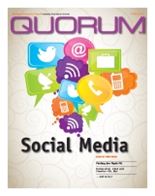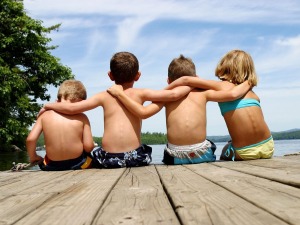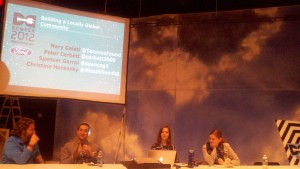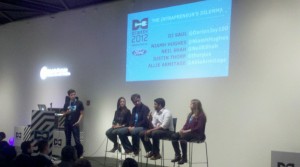Archive
Strengthen Community Bonds by Being Social
This month I had the privilege of having a guest article on social media appear in Quorum Magazine, a publication of the Washington Metropolitan Chapter of the Community Associations Institute.
To read the article in its entirety, click here:
While it was written for professional community managers, lessons for all abound. Here are a few excerpts:
Visual social media is big and getting bigger all the time.
Commit to listening and engaging with your community.
Storytelling has gone to the amateur. You become the reporter, the editor, the storyteller, the photojournalist. People and organizations who capture what’s happening are rewarded with greater attention.
Think about campaigns and themes. Think about what you would find interesting. Be curious. Be spontaneous. Find a new angle on an old story.
Develop ways you can be a resource for your community. Pinterest is a great platform for this. You could put together boards on area restaurants or nearby activities.
Ask questions. Perfect for Twitter or Facebook, asking genuine questions and soliciting input is a great way to engage the community.
Think creatively and stay engaged on social media, and you’ll see both your online and offline presence strengthened in the community.
Digital Authenticity and Community Sourcing
You have an opportunity every day to connect with your online community in genuine and profound ways. How you do that is up to you, your personal style, your goals, your community, etc. It should follow a few guidelines though.
- First, one of my favorite sayings is, “You can’t fake sincerity.” If you’re really not interested in others and what they have to say, it’s going to show. Your self-centeredness will reveal itself as you drone on and on about yourself, your accomplishments, your agenda, and/or your organization. It’s much like the guy at the party who keeps bragging about his job, his cars, his awards, his money, etc. He hasn’t taken the slightest interest in you, and you can’t wait to excuse yourself for a visit to the bathroom or to grab some more shrimp cocktail.
- If you’re managing some portion of the online presence for an organization, you are the rock star, the pro athlete, the actor, the model to many in your online community. I call it the Mean Joe Greene moment. Mean Joe Greene played for the fabled Steelers of the 1970s. Remember the resulting Coke commercial? A kid gives Mean Joe Greene a Coke after a game. As he turns to go, Mean Joe Greene tosses the boy his football jersey. While the kid was excited about getting the jersey of a professional football player, I would contend that the commercial resonated with us because we felt the connectedness between the average kid and the superstar, between an unknown boy and his hero. With social media you have an opportunity to make this kind of connection and impact every day. If your community isn’t getting this from you, they’ll invest their time and efforts elsewhere.
- I’m re-appropriating the term digital authenticity (#digitalauthenticity #authenticity) for a different purpose. I talked recently in a Higher Logic webinar about the importance of taking the concept of a handwritten note to your online community. Handwritten notes (not ones that are mass-produced to look like handwritten notes) are impactful because we get so few of them. We are inundated with blast emails, banner ads, print ads, etc. What stands out is something that is genuine, that is personalized, that is intended for one person. Therein lays the beauty and power of social media. If you’re not utilizing your online community to make these personal connections for your organization, you’re missing out. How does the concept of a handwritten note translate to online activity? I’m not entirely sure; but digital authenticity includes recognizing people as individuals, using a person’s name when addressing them, and directing content at times to a single person where appropriate.
- Most of us are familiar with the term crowdsourcing. Basically, it’s the notion that you ask a question to a random group of people (the “crowd”) to get to a solution or idea. I’d like to promote the concept of community sourcing (#communitysourcing). My guess is that you have at your fingertips an online community that is knowledgeable, well-informed, and involved. Utilize them, and they’ll appreciate it. I’m not talking about more surveys, polls, or evaluation forms. I’m also not talking about questions where you already know the answer or have a predetermined agenda. Ask genuine questions of your online community. You may be amazed at what your community will come back with. They may respond with more insight and creativity than you imagined they would. You get the benefits. And guess what? They’ll be engaged in the process more than ever before. Don’t forget to thank them personally, and they’ll be even more willing to assist the next time.
What approaches enable you to better connect? What ways have you found to effectively engage your online community?



